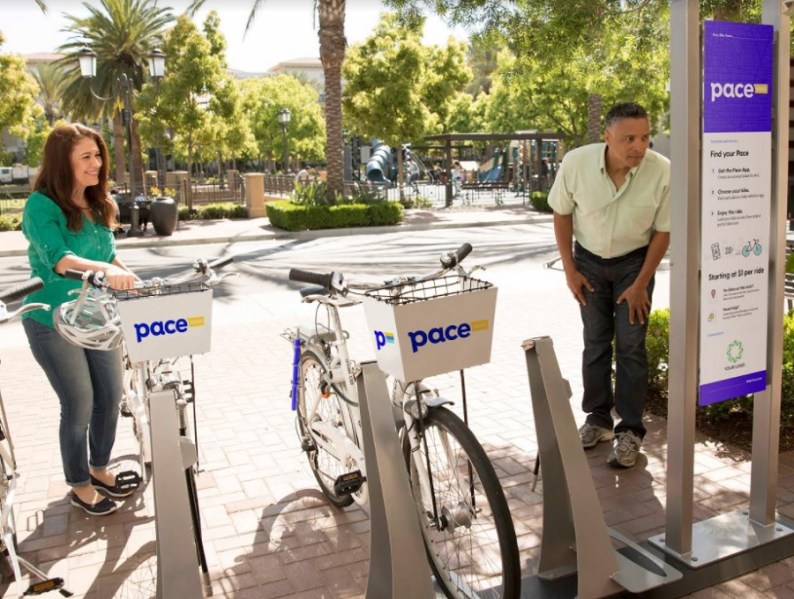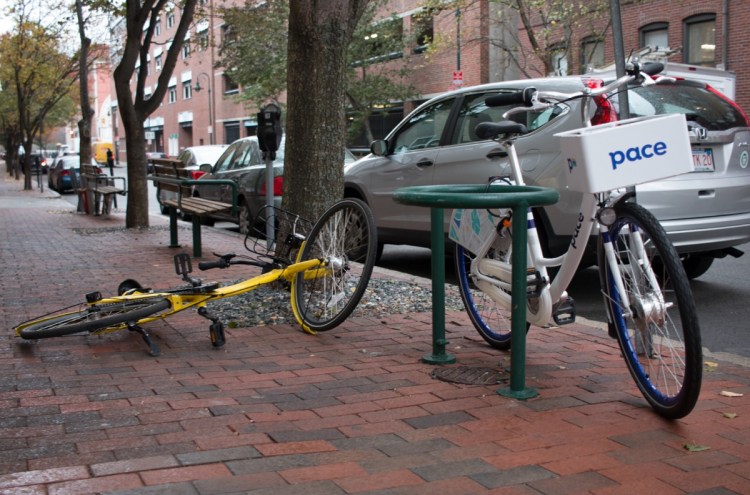Zagster, an operator of old-style docked bike services, is unveiling Pace, a new brand for a modern bike-sharing service that offers what it calls a smarter way to share bikes.
Rivals such as LimeBike, Spin, and Cycle Hop have moved into the U.S. market more quickly, but Zagster hopes to offer the benefits of “dockless” bike sharing while adding a simple innovation: You have to lock the bike to something.
Like other bike-sharing services, you can use your mobile phone to sign up for the service and then use it to unlock a bike. You can ride the bike around for a fee and then leave it wherever you want, rather than having to return it to a dock, as many earlier sharing services required. But while this is convenient for the rider, it has resulted in a lot of bike litter, with bikes left scattered in places where they don’t belong.
This problem is not unique to Zagster, of course. My kid saw a LimeBike in a lake in Seattle, thanks to some pranksters. Zagster’s Pace service, however, has a two-point security system that requires bikes to be locked to fixed objects, not just themselves. This mitigates theft and abuse and makes sure the discarded bikes don’t block public paths or roads. You can also return the bike to a dock, as Zagster has operated big networks of docked bikes in the past and places bike racks in key areas to maximize ridership.
June 5th: The AI Audit in NYC
Join us next week in NYC to engage with top executive leaders, delving into strategies for auditing AI models to ensure fairness, optimal performance, and ethical compliance across diverse organizations. Secure your attendance for this exclusive invite-only event.
Pace will debut in Tallahassee, Florida; Albuquerque, New Mexico; Rochester, New York; Knoxville, Tennessee; and Huntsville, Alabama. Each launch will happen before April 1, 2018.
With Pace, you download a free app on the App Store or Google Play. You tap the app to unlock a bike, and rides cost $1 per half hour.
“With Pace, Zagster is ushering in a new era of mobility for American cities and universities, furthering its mission to make the bike the most loved form of transportation,” said Timothy Ericson, founder and CEO of Zagster, in a statement. “As we bring Pace to new cities like Tallahassee and our existing customers like Albuquerque, Rochester, and Huntsville — dramatically increasing the size of each of their fleets in the process — we will become the largest dockless bike share provider in North America, with hundreds of thousands of shared bikes.”

Above: Zagster uses docks if you want them.
Zagster beta-tested Pace’s model and features from July through October in Rochester, New York, with good results. When compared to station-based bike shares in similar cities, the Pace model achieved an 800 percent increase in ridership in the first 90 days of service.
“With the arrival of Pace, the success we’ve seen by offering our citizens a flexible, modern bike-share service can be brought to other cities across the country,” said Rochester mayor Lovely Warren, in a statement. “In its first season of operations in Rochester, Zagster has become a vital and integral component of our city’s existing transportation network and shown its willingness to be a true community partner. Thanks to the Zagster’s efforts, we have been able to demonstrate how a dynamic bike-share system can play an important role in our efforts to create more jobs, safer and more vibrant neighborhoods, and better educational opportunities for our citizens.”
Cambridge, Massachusetts-based Zagster was founded in 2007 and operates more than 200 bike-sharing services across 35 states.
Zagster CEO Tim Ericson said in an email that the original Zagster was designed for more controlled environments, like small cities, corporate campuses, and real estate properties. These programs were smaller and based on docks, where companies paid for the bikes on a subscription basis.
Pace is designed for sharing bikes across universities or whole cities, where the bikes can be parked at dock stations but are not necessarily tied to them.
In an email, Ericson said:
Most of the players in the dockless space are clones of one another with incredibly minor differentiators, and they’re taking a narrow, shortsighted approach. Pace sees the bike share industry really differently. We take a holistic approach, and offer a dockless model that’s better in three big ways.
First, we don’t dump bikes and walk away. We partner with cities to intelligently design bike shares to fit the specific needs and environment of each community where we work, and to fully integrate bike sharing into the community at large.
Second, we have a proven model that’s better for cities. Unlike competitors, we fundamentally believe that bikes should lock to things. Our bikes feature a two-point security system to ensure bikes lock to fixed objects — not just to themselves — to mitigate theft and abuse and preserve public right of way.
Third, Pace offers the reliability of dedicated bike share hubs, plus the freedom of point-to-point travel, and ‘hold’ capabilities for mid-rental stops. Essentially, Pace has all of the benefits of dockless with none of the drawbacks, offering a solution that will work long term.
What’s really exciting is that we’re essentially a sleeping giant. Zagster anticipated the trends now playing out in the industry, and quietly equipped all of our bikes with dockless functionality we were prepared to turn on should our customers want that capability. So, if we were to flip the Pace switch for our 98 existing city and college bike shares, we would immediately boast the largest dockless bike share network in North America.

